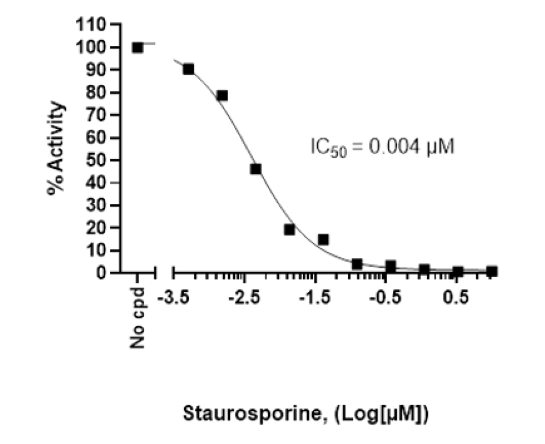Chemi-Verse™ BLK Kinase Assay Kit
The Chemi-Verse™ BLK Kinase Assay Kit is designed to measure BLK (B lymphocyte kinase) kinase activity for screening and profiling applications using ADP-Glo™ as a detection reagent. The assay kit comes in a convenient 96-well format, with enough purified recombinant BLK kinase, kinase substrate, ATP, and kinase assay buffer for 100 enzyme reactions.
- ADP-Glo™ Kinase Assay (Promega #V6930)
- DTT (Dithiothreitol), 1M, optional
- Microplate reader capable of reading luminescence
- Adjustable micropipettor and sterile tips
- 30°C incubator
| Catalog # | Name | Amount | Storage |
| 40401 | BLK, GST-Tag* | 5 µg | -80°C |
| 79334 | 5x Kinase Buffer 1 | 1.5 ml | -20°C |
| 79686 | 500 µM ATP | 50 µl | -20°C |
| 40217 | PTK Substrate (Poly-Glu,Tyr 4:1) (10 mg/ml) | 50 µl | -20°C |
| 79696 | White 96-well plate | 1 | Room Temp |
*The concentration of the protein is lot-specific and will be indicated on the tube.
BLK (B lymphocyte kinase) is a member of the Src non-receptor tyrosine kinase family. It is found primarily in B-cells, where it is involved in cell development and maturation signaling pathways. Overexpression of BLK has been associated with autoimmune disorders and B-cell linked-cancers, such as lymphoma and leukemia. Similarly to other Src kinases, BLK is inhibited by dasatinib, a drug approved under the name SPRYCEL® for the treatment of CML (chronic myeloid leukemia) in adults and children. The development of BLK-specific inhibitors is still an active research area, aiming at finding specific and high affinity inhibitors that can be used in the treatment not only of BLK-related lymphoma and leukemia, but also autoimmune disorders.
Yang S., et al., 2023 J Biomol Struct Dyn: 1-11.
Fu T., et al., 2022 Eur J Med Chem 229: 114051.


